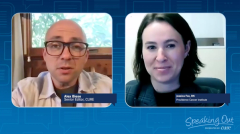
How a Prostate Cancer Diagnosis Can Impact Patients’ Mental Health
As part of our “Speaking Out” video series, we look at the association between prostate cancer and mental health.
Episodes in this series

While any cancer diagnosis comes with its share of mental health challenges, there are factors unique to prostate cancer that can be of particular concern to patients, as one radiation oncology nurse explained.
“[What is] interesting and unique to prostate cancer has to do with their staging, of course, and what degree of prostate cancer do they have,” Jessica Fox, a radiation oncology nurse with Providence Cancer Institute in Portland, Oregon said during a conversation that was part of the “Speaking Out” video series.
“This ends with them often seeing multiple doctors,” Fox said. “They have a consultation with a urologist, they have that option to get the prostate completely removed. They have a consultation with a radiation oncologist and they can possibly talk about several modalities of radiation that the patient might be eligible for. And sometimes, depending on their staging, it's a wait-and-see situation [where] it's low risk, it's slow growing, they have the option to just not do anything right now and just track PSA [prostate-specific antigen, a protein associated with the presence of prostate cancer in the body] and see what happens. And I think each of those aspects causes some degree of turmoil for the patient.”
“Making those decisions, it can be stressful, [patients] want to do what's best for them, they want to do what's going to have the most minimal side effects,” Fox said. “[They’re asking,] ‘How is this going to affect my life the least?’ And then, of course, there's the wait and see, which might be a blessing to some people. But also I've seen for others that this in itself is really stressful because that lingering [sense] of, ‘When am I going to have to do something? Am I going to have to do something? And sometimes patients just want to be done with it and not have to think about it.”
During the episode of “Speaking Out,” Fox also discussed the importance of establishing a rapport between patients and nurses, how cancer’s impact on patients’ day-to-day lives can impact their mental health and resources that are available to patients.
For more news on cancer updates, research and education, don’t forget to









